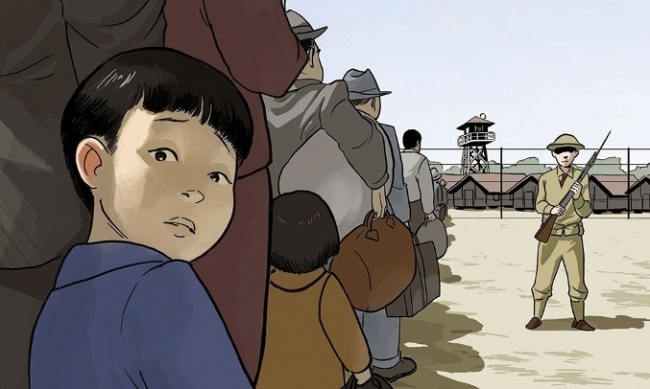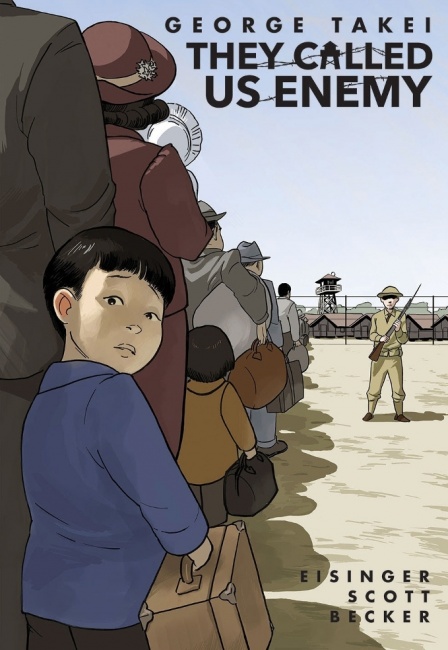They Called Us Enemy TP
Publisher: Top Shelf Productions
Release Date: July 16, 2019
Price: $19.99
Creator(s): George Takei, Justin Eisinger, Steve Scott, and Harmony Becker
Format: 208 pgs., Black & White, 7" x 9", Trade Paperback w/ French flaps
ISBN: 978-1-6030-9450-4
Age Rating: 12+
ICv2 Rating: 5 stars (out of 5)
Star Trek actor George Takei’s memoir of life in an internment camp for Japanese Americans during World War II comes along at moment of renewed interest in the history it depicts, and it offers what few others can: the experience of someone who actually lived in the camps. Takei and his family were among the over 100,000 Americans of Japanese descent who were held in the camps during the war. Some, like Takei, were American citizens by birth, while others, like his father, were not allowed to apply for citizenship because of their heritage.
Takei was five years old when he and his family were taken from their house at gunpoint and brought to the Santa Anita racetrack, where they were held with other detainees awaiting removal. From there they traveled by train to an internment camp in Arkansas, where they stayed for a year and a half, and then to Tule Lake, California, where they were held until 1946. As he tells his story, Takei is very conscious of the contrast between what he saw as a boy and what was really happening. When they were transported to Arkansas by train, his mother had a bag full of treats to keep the children entertained, so little George thought the trip was fun. Except when it wasn’t: The armed guards put a damper on things, and whenever the train pulled into a station, the blinds were pulled so no one outside could see the passengers.
The internment was driven by prejudice and fear, and Takei makes that part of his story too, showing how some politicians inflamed anti-Japanese feelings to advance their own careers and others advocated for the rights of the internees. He also depicts his family’s life after they were released and returned to Los Angeles having lost all their worldly possessions, including their home. Takei’s parents stand out as the heroes of this piece, and he helps the reader process some of what happened by depicting the after-dinner conversations he had with his father later in their lives. Remarkably, despite the injustice that was done to him and his family, the elder Takei never lost faith in the American political system. It may be flawed, he reasoned, but it was better than anything else.
They Called Us Enemy is compelling because it takes a moment in history and shows how it affected real people. The Japanese internees are no longer just a list of names or a line of faces in a black and white photograph. Takei shows his father and their fellow internees building a boardwalk to make walking to the mess hall and latrines easier in their swampy Arkansas camp, his mother smuggling in a sewing machine so she can make new clothes for her family, and his own disappointment when he realized the Santa Claus at a Christmas party wasn’t the real deal. Each of his memories brings richness and moments of grace into this sad and ugly story. All this is brought to life by artist Harmony Becker, who has a clean, deft style and a particular gift for drawing facial expressions.
The book is rated 12+, and it will fit comfortably on a young adult bookshelf, but it’s a good read for adults as well. The creators are gifted storytellers, and Takei has a great story to tell, full of unexpected twists. And as compelling as it is, it is also inspirational, a story of ordinary people and the choices they faced in an extraordinary time.
--Brigid Alverson

ICv2 Stars: 5 (out of 5)
Posted by Brigid Alverson on July 2, 2019 @ 8:39 am CT



